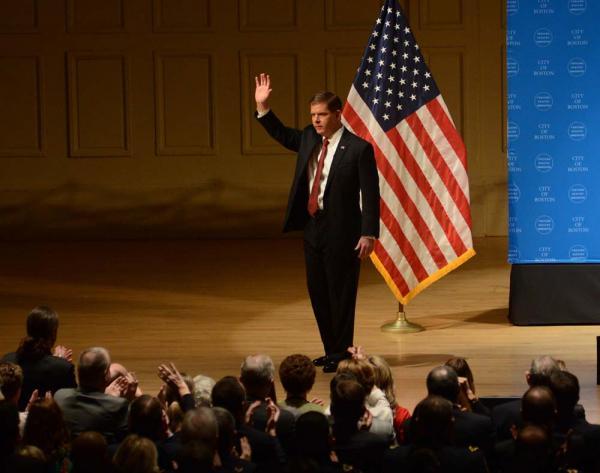January 13, 2015

Photo by Jeremiah Robinson/City of Boston
In his first "state of the city" address, Boston Mayor Marty Walsh on Tuesday pressed state lawmakers to endorse a pair of planned proposals creating tax incentives for middle-income housing and setting aside funding for low-income senior housing.
Boston would be allowed to designate special tax assessment zones in the city to spur an increase in middle-income housing, and private developers within the zones would not have to pay property taxes during a two-year construction phase, under one of the proposals. As a way to ensure affordable rents, developers would then pay reduced property taxes in the following years.
The city is also preparing 250 city-owned parcels for development with an eye towards creating low to middle income homes, Walsh said.
Walsh said he would additionally ask the Legislature to pass a bill requiring the Massachusetts Affordable Housing Trust Fund to aid in creating 1,500 units for low-income elders. The set-up would be similar to a federal program.
Citing U.S. Census data from 2010, the Walsh administration said there are 30,000 low-income elderly households, a number that will grow to over 44,000 by 2030.
"As a son whose mother lives in her own home I know seniors face special challenges making ends meet," Walsh said, adding that the city's water and sewer commission will increase a water discount for senior and disabled homeowners to 30 percent. "I've asked the utilities to follow suit as well."
Walsh outlined the requests and administrative moves as part of his "state of the city" address at Symphony Hall, which drew elected officials from across the state, including roughly 40 members of the Legislature, such as Sen. Thomas McGee (D-Lynn) and Rep. Smitty Pignatelli (D-Lenox). Walsh was a Dorchester state representative for 17 years before his election to Boston City Hall's top job.
Gov. Charlie Baker could not attend the speech due to an illness and was expected to be back at work on Wednesday, according to aides.
"Certainly in the Baker-Polito administration he'll have a strong partner, as we value the work that our mayors are doing across our state and we need them to be able to do the work that they do," Lt. Gov. Karyn Polito said after the speech. "This is a mayor that loves his city and we are going to work very closely with him."
Asked about the legislative proposals Walsh highlighted in the speech, Polito said, "Well, he certainly made his mom happy tonight, and I think he's someone that understands that the aging community here in the city needs attention and he wants them to be able to live longer in the homes and in the neighborhoods that they have lived for so long."
In his speech, Walsh said city officials are working to create a Boston School Building Authority, which would not require legislation. Staffed by current city employees with no additional cost, the agency would focus on oversight and pursuing funding and planning for new school construction, according to the Walsh administration.
"Too many of our aging schools don't meet the standards of 21st century learning," Walsh said.
The new authority will seek a larger share of the revenue it generates for the Massachusetts School Building Authority, with city officials claiming they provided $394 million to the state authority between fiscal years 2007 and 2014 while only receiving $140 million in reimbursements for school repairs and other projects.
Walsh said more than 30 percent of Boston high school students don't graduate in five years. "This is just not acceptable," he said, adding that city officials are seeking to ratify a plan with the Boston Teachers Union to add 40 minutes to the day for students through eighth grade and expanding full-day pre-kindergarten for four-year-olds.
Walsh also said that in February he will get the names of the finalists looking to become the next superintendent of Boston Public Schools. A search committee has been working to narrow the field.
While the state grapples with a midyear budget deficit that Baker says is more than $500 million, Walsh described the economy as "flourishing," saying the state of the city is "strong and getting stronger."
Walsh said 25,000 additional Bostonians worked last year. "That's the highest job growth since 2007 and has lowered our unemployment rate to 5.2 percent," he said.
With Boston selected as the U.S. Olympic Committee's bid city for the 2024 summer games, Walsh called it a "once-in-a-lifetime" opportunity.
While bid details have not been released, Walsh and other Olympics boosters continue to tout transparency.
"That's why the public process is the ultimate benefit. It's why I've committed to you that we will hold transparent conversations on every impact of every neighborhood," Walsh said.
Walsh also touted a "ParkBoston" app that could be downloaded on Tuesday night. "Soon you won't have to fumble for quarters to pay the parking meter," he said.
Walsh expressed pride in Boston's peaceful response between protesters and local police in the wake of the deaths of two black men after encounters with white police officers.
"The truth is that when it comes to race and class, Boston has a lot of unfinished business. We must not be afraid to talk about it," Walsh said.
Working with the Rockefeller Foundation, Walsh said the city plans to convene a "citywide conversation" this year "aimed at healing divisions that go back generations."
"Bostonians need to know that, at a deep level, we can depend on each other. And when we see injustice, we can and will speak up for each other," he said.
Boston City Councilor At-Large Ayanna Pressley said Walsh laid out a "robust vision" that touched on affordable housing and education.
"It was good to see those as centerpieces in his remarks," she said.
Michael Norton contributed reporting.
Topics:


